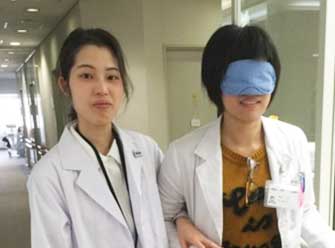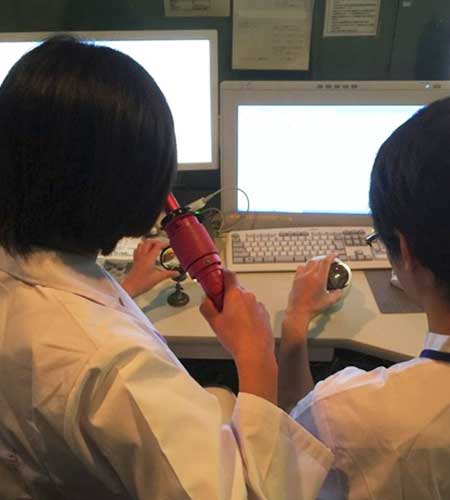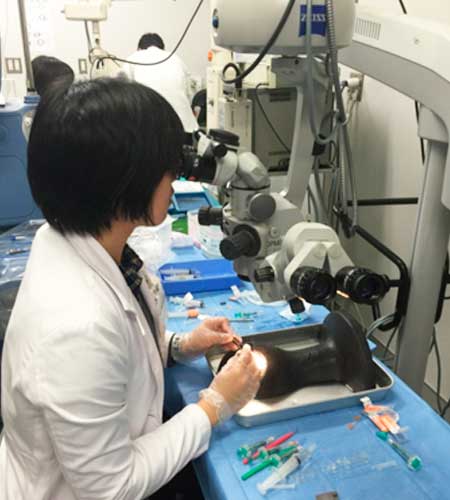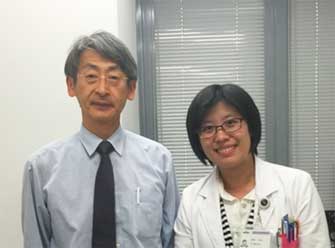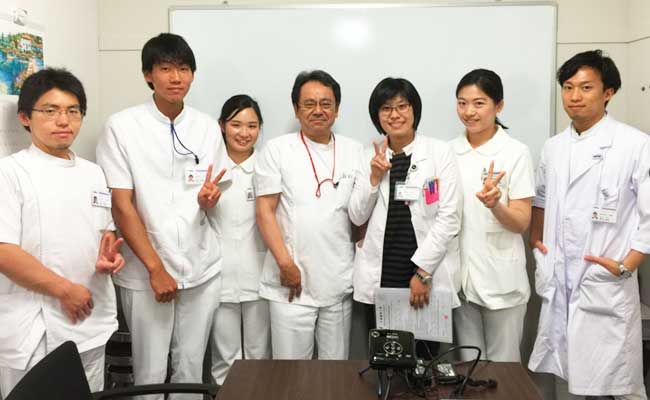Report of Oversea Clerkship Program in Osaka City University
Clinical Training report
Yu Chen Hu

China
Country
China Medical University
School
13th April 2016~
Elective period
I. Impression and appraisal:
Within this one month as a exchange student learning in OCUH, I have learned more than just the knowledge of clinical medicine.From the medical student there, I saw their attitude toward the senior and being so polite to everyone including the professors, doctors, nurse staffs and even the patients. It dawned on me that while everyone keep saying students in Taiwan should learn how the western students’ attitude toward asking questions and discussing with the doctors, do we really know what we are emphasized? Asking questions and discussing with the professors is definitely right, but do we still keep in mind to be polite? Maybe we should think about how to keep manner and attitude together and not forget about who we are during our learning.
One more thing to say is about the transferring system in Japan really impressed me a lot. Since there are not so many patients in OCUH as in our hospital CMUH, I was firstly thinking about the cost may be high in Japan. However, after discussing with the medical student there, I realized that there is health insurance in Japan so that the patients there only have to pay for the one-third of the cost and most of the patients are affordable. After then, a professor told me that there is a transferring system in Kansai area for GYN&OBS patients. Once a doctor or a hospital find out that they cannot take care of the patient in a complicated situation, they can transfer to another hospital for help and they can attend the conference discussing about the patient and the further management. I hope there will be a similar medical system in Taiwan to provide a better medical environment for both of the patients and the doctors.
II. Experience, Acquisition and Course Contents:
1. OphthalmologyDuring two weeks in Ophthalmology, there are the most two experience that impressed me the most.
First of all, it was about an experience that we were asked to cover our eyes and pretend that we were blind. Actually, this was not my first time to experience and the reason why it impressed me is because what the professor said. The professor told us the difference between the patient who has cataract and who has glaucoma is that the former one has hope to repair their visual acuity and the latter one do not. This is why we need to feel the fear of being a blindness and then we may know how to show our empathy to the patient who is diagnosed to have glaucoma. In Taiwan, we medical students are always taught that we need to show our empathy on the patients and to cure a person, but not a disease. From this experience, I think I have gained a more precise insight about the empathy.
The other is about how to do a surgery for cataract. In previous experience in Ophthalmology in Taiwan, I have already learned the procedure about the cataract and have seen many surgeries. However, it was this experience that let me know that knowing how to do is far more easily then really doing it. In this class, we used the pigs’ eye to learn how to do the surgery and it was really hard for us. I really appreciated this experience and hope in the future, I can do better if I became an ophthalmologist.
2. Gynecology and Obstetrics
Two things impressed me the most in Gynecology are the attitude toward learning and the learning in the operating room.
On the very first day, the professor taught us about the condition of the patients that we were going to take care of. Since we had to do the presentation in English to another professor at the ward in the same afternoon, the professor kept teaching us from 10:00 to 14:00 without eating lunch. This really impressed me because of the attitude toward medicine and the passion about teaching and responsibility.
The other impressed me the most is what happened in the operating room. In every operation I watched, all of the doctors who were related to the operation got into the operating room before the patient and left the operating room after the patient was send to the recovery room. It really astonished me because in our CMUH, due to some reason, the doctors may not have so much time to spend in the operating room and they may leave before the patient waking up from the anesthesia. I really hope that in the future, the doctors in Taiwan can have more time to take care of the patients.
3. Interaction with Students:
During my time here in Osaka City University Hospital (OCUH), I have met a lot of medical student here and had many conversations with them talking about the education of a medical student and about the culture and their attitude toward lives. I was really lucky to know the members of a club called ISAO and the members of the club are the medical students who want to exchange to other countries. From them, I have known that being a female doctor may be a little bit difficult for them to get married in the future because many Japanese still think that women should stay at home and taking care of the family. It was incredible for me to imagine such the condition happen in a country like Japan. However, I believe in the future, we can both make some difference via the friendship between the students and doctors I met in OCUH and me.











